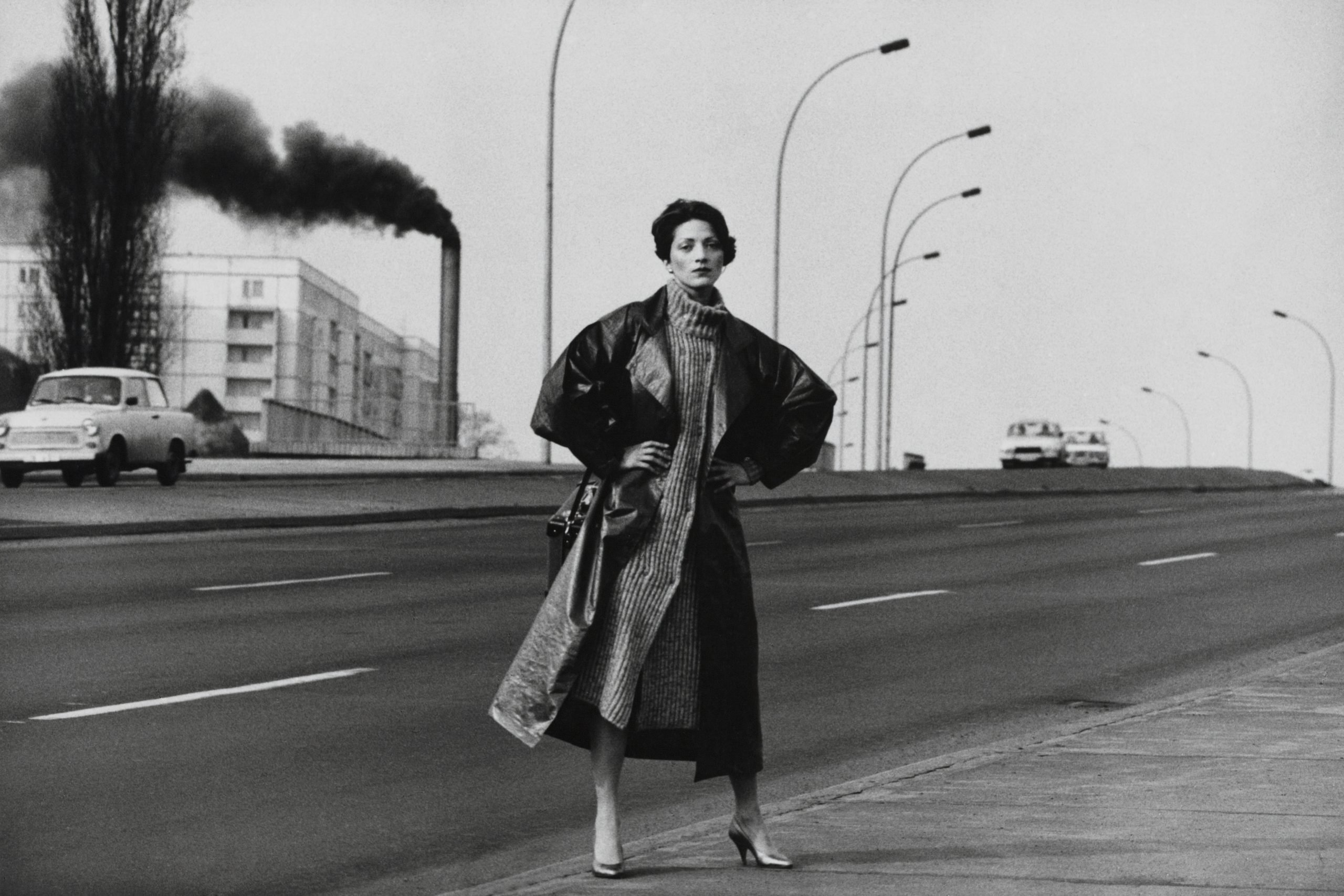
Everything that passed in front of the lens of Sibylle Bergemann seems imbued with hints of steely glamor.
The celebrated photographer, who died in 2010, captured the life, parties, fashion, architecture, and youth subcultures of East Berlin at the height of the Cold War. With a sensitive eye and sense of irony not unlike that of contemporary artists such as Nan Goldin or Annie Leibovitz, Bergemann gained acclaim for edgy and triumphant portraits of women, as well as her views of the city where she was born. This makes her perspective especially vital post-reunification, when the memory of East German life was swept away.
Bergemann documented the transformations that took place in and around the city both before and after the collapse of the Berlin wall in 1989, subverting the propagandizing style that was prevalent at the time. For instance, in a series called “The Monument,” Bergemann systematically documented the creation and erection of statues of Karl Marx and Friedrich Engels by German Democratic Republic’s Ministry of Culture between 1975 to 1986. From today’s view, it is hard to tell whether these socialist icons are being constructed or dismantled. Instead, Bergemann’s photos seem to speak to the impermanence of political ideas.
Sibylle Bergemann, Das Denkmal, Berlin, Februar 1986 © Estate Sibylle Bergemann/OSTKREUZ. Courtesy Loock Galerie, Berlin
At the Berlinische Galerie, more than 200 works, including 30 images that are being shown for the first time, show not only the raucous parties and people of East Berlin, but also this artist’s travels to New York, Moscow, and Dakar. These latter are particularly meaningful and charged images: It was rare for artists to travel outside of East Germany. “The first time they let me go to Paris, I was 38,” she said in later interviews. “I fought for it for nine months and then I was allowed to go. Without money, of course.”
See some of the artist’s works below.
“Stadt Land Hund” is on view at the Berlinische Galerie in Berlin until October 10.
Sibylle Bergemann, Unter den Linden, Berlin 1968 © Estate Sibylle Bergemann/OSTKREUZ
Sibylle Bergemann, Selbstporträt, Schiffbauerdamm, Berlin 1986 © Estate Sibylle Bergemann/OSTKREUZ. Courtesy Loock Galerie, Berlin
Sibylle Bergemann, P2, 1981 © Estate Sibylle Bergemann/OSTKREUZ
Sibylle Bergemann, Nina und Eva Maria Hagen, Berlin 1976 © Estate Sibylle Bergemann/OSTKREUZ. Courtesy Loock Galerie, Berlin
Sibylle Bergemann, Moskau, 1974 © Estate Sibylle Bergemann/OSTKREUZ
Sibylle Bergemann, Marisa und Liane, Sellin 1981 © Estate Sibylle Bergemann/OSTKREUZ
Sibylle Bergemann, Katharina Thalbach, Berlin 1974 © Estate Sibylle Bergemann/OSTKREUZ. Courtesy Loock Galerie, Berlin
Sibylle Bergemann, Frieda, Berlin 1982 © Estate Sibylle Bergemann/OSTKREUZ
Sibylle Bergemann, Fenster, Berlin, undated © Estate Sibylle Bergemann/OSTKREUZ. Courtesy Loock Galerie, Berlin
Sibylle Bergemann, Das Denkmal, Gummlin, Usedom, Mai 1984 © Estate Sibylle Bergemann/OSTKREUZ. Courtesy Loock Galerie, Berlin
Sibylle Bergemann, Clärchens Ballhaus, Berlin 1976 © Estate Sibylle Bergemann/OSTKREUZ. Courtesy Loock Galerie, Berlin
Sibylle Bergemann, Caravan-Ausstellung, Berlin 1980 © Estate Sibylle Bergemann/OSTKREUZ. Courtesy Loock Galerie, Berlin
Sibylle Bergemann, Bernauer Straße, Berlin 1990. © Estate Sibylle Bergemann/OSTKREUZ. Courtesy Loock Galerie, Berlin